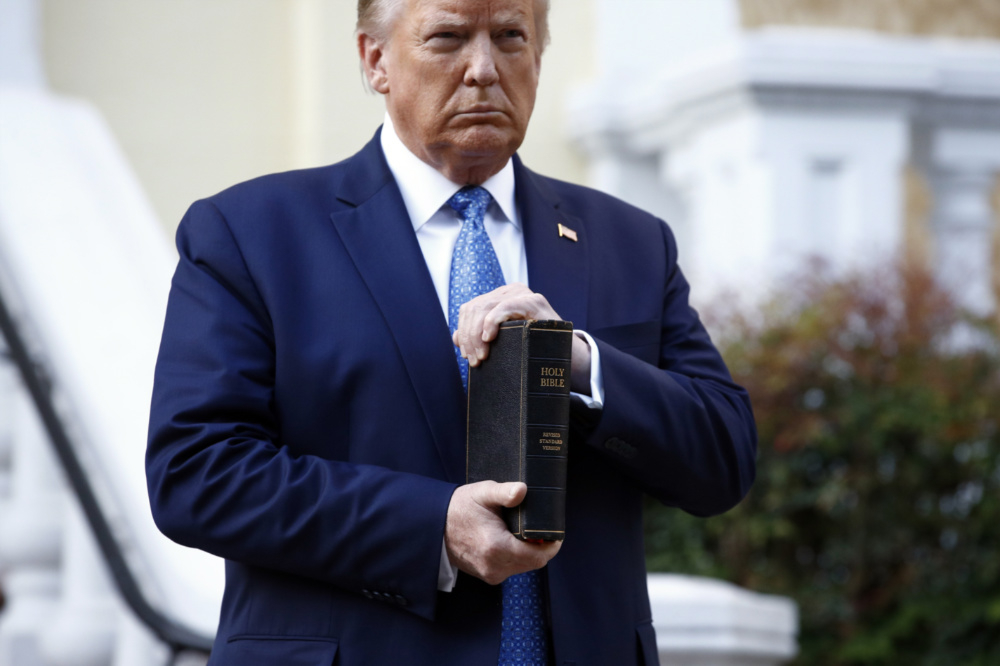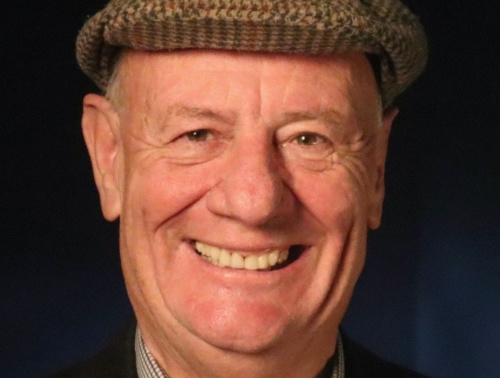
Rev TIM COSTELLO looks at how the fear of secularism is driving support for conservative politics in the US – and elsewhere…
US President Donald Trump recently said at a press conference that Joe Biden, his Democratic presidential opponent, is “following the radical left agenda, [he will] take away your guns, destroy your Second Amendment, no religion, no anything, hurt the Bible, hurt God”. He went on to say of Biden “he’s against God”. The Biden camp answered that Biden is a lifelong Catholic for whom faith is foundational.
Eric Metaxas, one of the foremost US evangelicals supporting President Trump tweeted a few weeks back that “Jesus was white”. It may come as a shock to Eric that Jesus probably looked more like Osama bin Laden and more the colour of Kamala Harris, the newly chosen Democrat VP, than Brad Pitt.

President Donald Trump holds a Bible as he visits outside St John’s Church, known as the President’s Church, across Lafayette Park from the White House on Monday, 1st June, in Washington DC. PICTUre: AP Photo/Patrick Semansky/File photo.
These comments illustrate something deep about the fears and the grievance culture of US white Christians and their cheering for Trump’s race baiting style of leadership. It goes to a tribal faith that fears secularism and a secular state that Trump is playing to. Curiously they seem to fear other Christians too, as most Hispanic and African Americans are also Christians. So the adjective ‘white’ becomes more definitive than the noun ‘Christian’.
There are many different reasons why whites support Trump but for large swaths of evangelicals it comes from their perception that religious liberty is at stake and Trump is big and bad enough to protect their liberty. They believe he will protect God, guns and their religion. They feel massively under threat from secularism and Trump is perceived to offer a voice of protection and promotion of their interests (which go well beyond any religious commitments). They feel persecuted by secularists and this is the grievance for their fight in the culture wars.
“There are many different reasons why whites support Trump but for large swaths of evangelicals it comes from their perception that religious liberty is at stake and Trump is big and bad enough to protect their liberty. They believe he will protect God, guns and their religion.”
None of them now are trying defend Trump as having a Christian faith that conforms to anything that approximates Biblical values of compassion, kindness, love of enemies. Nevertheless, his tear gassing of peaceful protestors to hold up the Bible (upside down) in front of the President’s Church was praised by some evangelical leaders as defending religious liberty from secularism which is identified with the Democrats. Through his Supreme Court and judiciary appointments he may deliver for them on abortion, euthanasia, gay marriage which, for this group, have become key faith issues. This hope, and the hope he will be a bulwark against the progressive political agenda, is keeping them aligned to Trump.
Racism is their blind spot and remains white America’s original sin with the death of George Floyd becoming the flashpoint between black and white evangelicals. The most segregated hour in the US is still Sunday at 11am as Dr Martin Luther King, Jr, said decades ago. This is curious and tragic because Christian faith was internationalist from its inception and envisioned a faith that was multi-ethnic, transcending race.
Such attitudes of threat from secularism and even persecution are felt elsewhere. I remember being in a G20 meeting with President Putin and six others in 2013 in Moscow when he told us he instructs young Russians to go to church and gives millions of roubles to build Orthodox churches. He thought I, being a reverend, would be impressed. I was more curious that an ex-KGB agent was now sounding like a church evangelist. But the Orthodox Church fears the West’s secular attitudes and Putin is their champion. He has wrapped himself in the faith, but one wonders at what is lost for a church that makes a deal with such a regime.
What perplexes people is Christianity being owned by Trump and the Republicans as a political faith – the mixing of what should be the separate realms of God and Caesar. Instead of a faith that ignores flag and nationalism and cuts across boundaries of race, culture and gender to emphasise that disparate groups belong together in a community of love, faith has become politically weaponised and recruited by partisan politics.
US evangelicals might reflect on how their mix of faith and partisan politics and their suspicion of the secular state puts other Christians around the world at risk. In India, Christians are feeling persecuted through a resurgent Hinduism under Prime Minister Narendra Modi. He has given a nod to the doctrine of Hindutva that declares “to be Indian is to be Hindu” which leaves historical minorities like Christians, Jains and Sikhs feeling threatened. And Muslims are watching in shock as Modi opens a new Hindu temple built on the site of an ancient mosque destroyed in 1992 by Hindu nationalists. Under the secular Indian constitution opening this temple would once have been unthinkable for a PM as it intensifies religious hatreds. Hindus, though a majority, feel that they can ignore a secular constitution.
Jesus’ great innovation when asked whether Jews should pay tax was to ask whose head was on a Roman coin and then declare, “render to Caesar what is Caesar’s and render to God what is God’s”. The roots of the separation of church and state lie here, along with the modern lesson for believers to resist the urge to legislate their faith.
“Jesus’ great innovation when asked whether Jews should pay tax was to ask whose head was on a Roman coin and then declare, ‘render to Caesar what is Caesar’s and render to God what is God’s’. The roots of the separation of church and state lie here, along with the modern lesson for believers to resist the urge to legislate their faith.”
As Yale theologian Miroslav Volf says, the secular state (as opposed to secularism) “should neither be religious, nor secular, but it should be neutral, and more precisely, it should be impartial towards all overarching interpretations of life”. Free expression of religious views in the public square is good for everyone, but it is perilous when faith is tied too closely to party politics. The situation in the US provides an illustration of what happens when the Jesus story – which is neither left nor right – gets entangled in one party and its political agenda. Or, as Jesus described his politics, “My kingdom is not of this world”, but from above. But though not ‘from’ this world, it most definitely is good ‘for’ this world.
In the name of free speech there will inevitably be secular hostility that hurts believers but that is not the same as persecution nor a threat to religious freedoms as long as the secular state stays neutral and protects religious expression. Indeed, it is impossible to have multiculturalism without guaranteeing the religious freedom of the multi-faiths that undergird it. But these faiths must resist politicising themselves. They are faiths to be freely pursued not party recruiting bases for politics.

Rev Tim Costello is one of Australia’s most well-known Christian social activists, a former chief executive and chief advocate with World Vision Australia, and currently executive director of Micah Australia and a Senior Fellow of Centre for Public Christianity as well as a member of the Sight Advisory Board.





